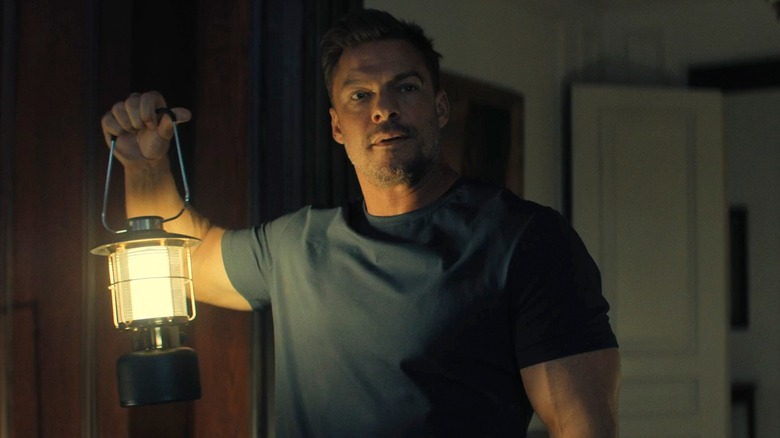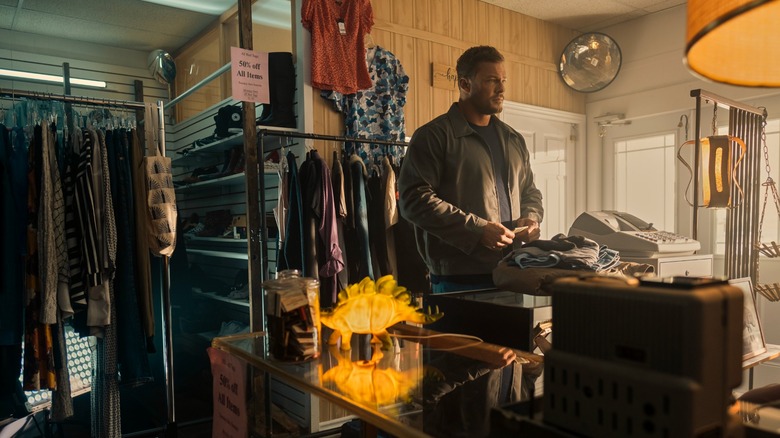
In Lee Child's "Jack Reacher" novel series, the titular protagonist is always on the go. As someone who doesn't want to settle down in one place, Reacher travels a lot, squatting in abandoned buildings
and carrying nothing except a toothbrush and an ATM card. Sometimes when he's on a mission, Reacher has to ditch his cellphone too, but the upside of having very little to your name is the gift of anonymity. As he owns nothing that can be traced back to his past as an army major, Reacher can assume any identity he wants without raising immediate suspicion.
Jack Reacher has never been a conventional heroic figure, as Child frames him as a morally sound Goliath who sticks to his own code. This complexity has generated enthusiastic reader/audience interest in Reacher's everyday life, as he does everything a traditional hero doesn't, but still manages to look like the coolest person in the room. Everything about Reacher is minimalistic, right from his choice of cheap, durable clothing that helps him blend in to his approach towards bad guys who don't listen to reason. When words fail to make an impact, Reacher's fists do all the talking, and sometimes, these one-sided conversations are loud. At the end of the day, Reacher embodies pragmatic lawlessness: he's instinctive and level-headed at the same time, a chaotic neutral in the truest sense of the term.
In the interest of shedding light on the more intimate aspects of Reacher's pragmatic yet instinctive vagabond existence, Child discussed this topic with longtime "Jack Reacher" fan Stephen King (who knows a thing or two about writing unforgettable characters) during a 2015 event held at Harvard University. This wide-ranging conversation touched on one of the biggest problems modern crime thriller writers encounter: balancing their drama with enough realism that readers can relate to and invest in what they're reading. In this case, the authors touched upon Reacher's choice to routinely discard his clothes and thrift new ones, which Child explained with tongue-in-cheek candor. He's what the author had to say.
Read more: Every Taylor Sheridan TV Show, Ranked From Worst To Best
Child Explains Reacher's Hyper-Pragmatic Approach To Everyday Clothing (And Doing Laundry)

Although several iterations of Reacher exist within the live-action sphere, Alan Ritchson's rendition in Prime Video's "Reacher" series is the most nuanced and memorable version (so far). Ritchson brings a subdued vulnerability to the role, playing a character that can contain multitudes without feeling too different from Child's literary counterpart. In this version, Reacher is more sincerely warm, but is also capable of being justifiably vindictive when the occasion demands it. But when he's not chasing criminals across rooftops or rage-baiting a guy twice his size (!), Reacher is pretty chill as a vagabond figure who occasionally stops at a pawn shop to sell old records.
Ritchson's Reacher seems to have an affinity for mono-color tees and jeans combos that are usually accompanied by an earth-toned work boot that can land a sickening roundhouse kick. Reacher rarely changes his boots in the series, but has been seen laying low at a laundromat to have his clothes washed instead of buying new ones. However, this seems to be more of an emergency measure as opposed to being a consistent habit.
King brought up Reacher's tendency to discard his clothes (instead of washing them) during his conversation with Child, stating how it is "not very politically correct" but that at the very least, the clothes are "biodegradable." King also mentions Reacher's habit of ironing his pants by sticking them under mattresses at motels, and Child elaborates on these hyper-specific habits to an extent:
"I thought the clothes thing was rigorously rational; they had placed it on the agenda of what you're going to do about clothes and laundry, so I thought that was just a rational answer. And I was totally surprised that anybody ever noticed it. But it's one of the things that people love to know about, including his underwear [laughs]. And it's very different in America than Europe as well, because in America, people are very concerned that for several days, he's wearing the same clothes. That is not acceptable to Americans. In Europe, they don't think twice about that."
I don't have much to say about the American vs. European debate about Reacher's tendency to wear a pair of jeans and a T-shirt (and underwear!) for a long time, but Reacher seems to be the kind of person to value competent efficiency above all else. Motels offer bathrooms to wash up in (and mattresses to "iron" clothes, apparently), but when he feels that it's time for a new set of clothes, he simply discards them and buys new ones. Needless to say, this adds a sense of rugged machismo to his appearance (that is aesthetically mirrored in Ritchson's Reacher), and it's reflected in the DIY ethos that defines Jack Reacher as a character.
While most crime thrillers don't address a lot of mundane, day-to-day routines in favor of exaggerated dramatics, "Jack Reacher" does both, and does both rather well. What more can a genre enthusiast ask for?
If you're looking for the easiest way to keep up with all the major movie and TV news, why not sign up to our free newsletter?
Read the original article on SlashFilm.










